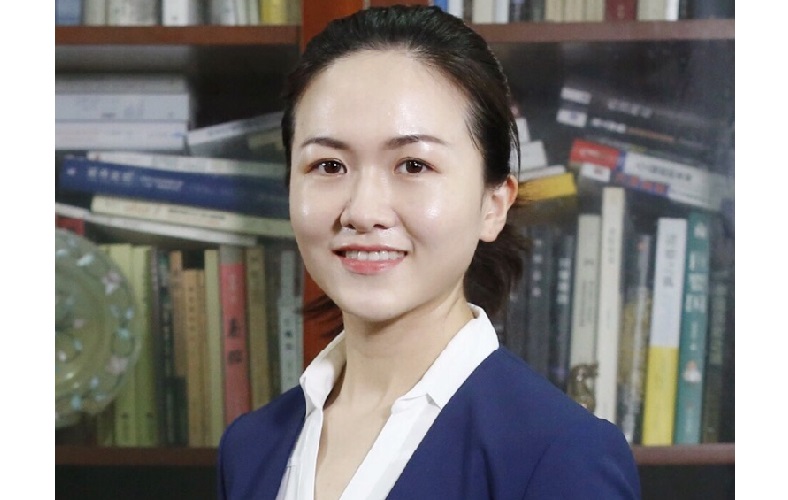Prof. DAI Yun
B.A. (PKU), M.A. (PKU), M.Ed. (UCSB), Ph.D. (UCSB)Assistant Professor
Introduction
Dr. Dai is an Assistant Professor of Curriculum and Instruction at the Chinese University of Hong Kong (CUHK). Before joining the CUHK in 2019, she worked as Postdoc Fellow in engineering education at the University of Southern California. Her research interests broadly revolve around artificial intelligence (AI) as a subject matter in the K-12 education and as a learning tool in higher education. Her current research focuses on: (1) teaching and learning artificial intelligence in the K-12 context, (2) personal epistemology of STEM teachers, and (3) generative AI in higher education.Research Areas
AI pedagogy, STEM education, learning sciences and technology, digital humanityCourses
PEDU 6126: Special Topics in STEAM Education and ResearchPEDU 6052: Curriculum Evaluation: Theory & Practice
PEDU 6004: Ethnographic Study in Education Research
Grants and Funding
- PI. Investigating upper primary students’ misconceptions and learning trajectories in an introductory artificial intelligence course. Direct Grant at the Chinese University of Hong Kong, 2023.
- PI. Fostering quality online academic help seeking through an analytics-enhanced course forum in large college classes. Research Grant Council, the Early Career Scheme, 2021-2023.
- Co-I. The curriculum development of artificial intelligence and education in Hong Kong schools, Quality Education Fund, 2021-2022.
- PI. Design-based research on student-facing learning analytics and pedagogical supports for self-regulated learning in online education. Direct Grant at the Chinese University of Hong Kong, 2019-2021.
- PI. Women in Engineering Visiting Funding Scheme, University of New South Wales, Australia, 2019.
- Co-PI. To support technology-enhanced global learning in the Grand Challenges for Engineering program. James N. Kirby Foundation, Australia, 2017-2018.
- Co-PI. Deploy a Peer-to-Peer Learning System for more Personalized, Inclusive and Collaborative Learning. UNSW Scientia Education Investment Fund Program, Australia, 2017-2018.
Selected Publications
- Dai, Y. (2024). Dual-contrast pedagogy for AI literacy in upper elementary schools. Learning and Instruction, 91 (2024), 101899. https://doi.org/10.1016/j.learninstruc.2024.101899
- Dai, Y., Lai, S., Lim, C. P., & Liu, A. (Forthcoming). A scoping review of university policies on generative AI in Asia: Promising practices, gaps, and future directions. Journal of Asian Public Policy. DOI: 10.13140/RG.2.2.21783.38563
- Dai, Y., Lai, S., Lim, C. P., & Liu, A. (2023). ChatGPT and its impact on research supervision: Insights from Australian postgraduate research students. Australasian Journal of Educational Technology, 39(4), 74–88. https://doi.org/10.14742/ajet.8843
- Dai, Y., Lin, Z.Y., Liu, A., Dai, D., & Wang, W.L. (2023). Effect of an Analogy-Based Approach of Artificial Intelligence Pedagogy in Upper Primary Schools. Journal of Educational Computing Research. https://doi.org/10.1177/07356331231201
- Dai, Y., Lin, Z.Y., Liu, A., & Wang, W.L. (2023). An embodied, analogical and disruptive approach of AI pedagogy in upper elementary education: An experimental study. British Journal of Education Technology. https://doi.org/10.1111/bjet.13371
- Hu, X., Liu, A., Li, X., Dai, Y., & Nakao, M. (2023). Explainable AI for customer segmentation in product development. CIRP Annals. https://doi.org/10.1016/j.cirp.2023.03.004
- Dai, Y., Liu, A., & Lim, C.P. (2023). Reconceptualizing ChatGPT and generative AI as a student-driven innovation in higher education. Procedia CIRP, 119, 84-90. https://doi.org/10.1016/j.procir.2023.05.002
- Wang, X.Z., Anwer N., Dai, Y. & Liu, A. (2023). ChatGPT for design, manufacturing, and education. Procedia CIRP, 119, 7-14. https://doi.org/10.1016/j.procir.2023.04.001
- Dai, Y., Liu, A., Qin, J., Guo, Y., Jong, M. S. Y., Chai, C. S., & Lin, Z. (2023). Collaborative construction of artificial intelligence curriculum in primary schools. Journal of Engineering Education, 112 (1), 23-42. https://doi.org/10.1002/jee.20503
- Dai, Y. (2023). Negotiation of epistemological understandings and teaching practices between primary teachers and scientists about artificial intelligence in professional development. Research in Science Education, 53(3), 577-591. https://doi.org/10.1007/s11165-022-10072-8
- Xia, Q., Chiu, T. K., Lee, M., Sanusi, I. T., Dai, Y., & Chai, C. S. (2022). A self-determination theory (SDT) design approach for inclusive and diverse artificial intelligence (AI) education. Computers & Education, 189, 104582. https://doi.org/10.1016/j.compedu.2022.104582
- Yue, M., Jong, M. S. Y., & Dai, Y. (2022). Pedagogical design of K-12 artificial intelligence education: A systematic review. Sustainability, 14(23), 15620. https://doi.org/10.3390/su142315620
- Chai, C. S., Lin, P. Y., Jong, M. S. Y., Dai, Y., Chiu, T. K., & Qin, J. (2021). Perceptions of and behavioral intentions towards learning artificial intelligence in primary school students. Educational Technology & Society, 24(3), 89-101.
- Lin, P. Y., Chai, C. S., Jong, M. S. Y., Dai, Y., Guo, Y., & Qin, J. (2021). Modeling the structural relationship among primary students’ motivation to learn artificial intelligence. Computers and Education: Artificial Intelligence, 2, 100006.
- Dai, Y., Chai, C. S., Lin, P. Y., Jong, M. S. Y., Guo, Y., & Qin, J. (2020). Promoting students’ well-being by developing their readiness for the artificial intelligence age. Sustainability, 12(16), 6597.
- Dai, Y., Liu, A. (2019). Understanding student variances in learning outcomes and task interpretations from multimedia presentations. British Journal of Education Technology, 50(5), 2685-2702.
- Dai, Y. (2019). Situating videoconferencing in a connected class toward intercultural knowledge development: A comparative reflection approach. The Internet and Higher Education, 41, 1-10.
- Dai, Y., Lu, S., & Liu, A. (2019). Student pathways to understanding the global virtual teams: An ethnographic study. Interactive Learning Environments, 27(1), 3-14.
- Dai, Y., Liu, A., Morrison, J., & Lu, S. (2016). Systemic design of interactive learning environment for global engineering courses. International Journal of Engineering Education, 32(6), 2597-2611.
- Green, J. L., Joo, J., Dai, Y., Hirsch, T., Chian, M., & David, P. B. (2016). Challenges in understanding different epistemologies for studying learning: A telling case of constructing a new research agenda. International Journal of Educational Research. 84, 119-126.
- Liu, A., Dai, Y., & Lu, S. (2015). Effectiveness of E-learning 2.0 tools and services to support learner-learner interactions in a global engineering class. International Journal of Engineering Education, (31)2, 553-566.
- Green, J.L., Dai, Y., Joo, J., Williams, E., Liu, A., & Lu, S. (2015). Interdisciplinary dialogues as a site for reflexive exploration of conceptual understandings of teaching–learning relationships. Pedagogies: An International Journal, 10(1), 86-103.
